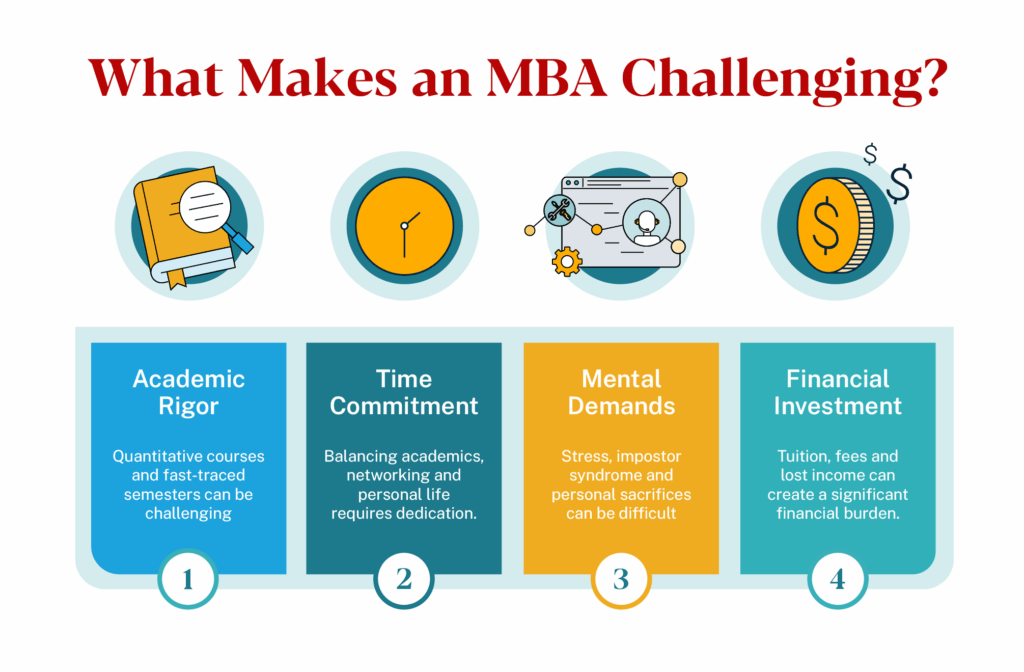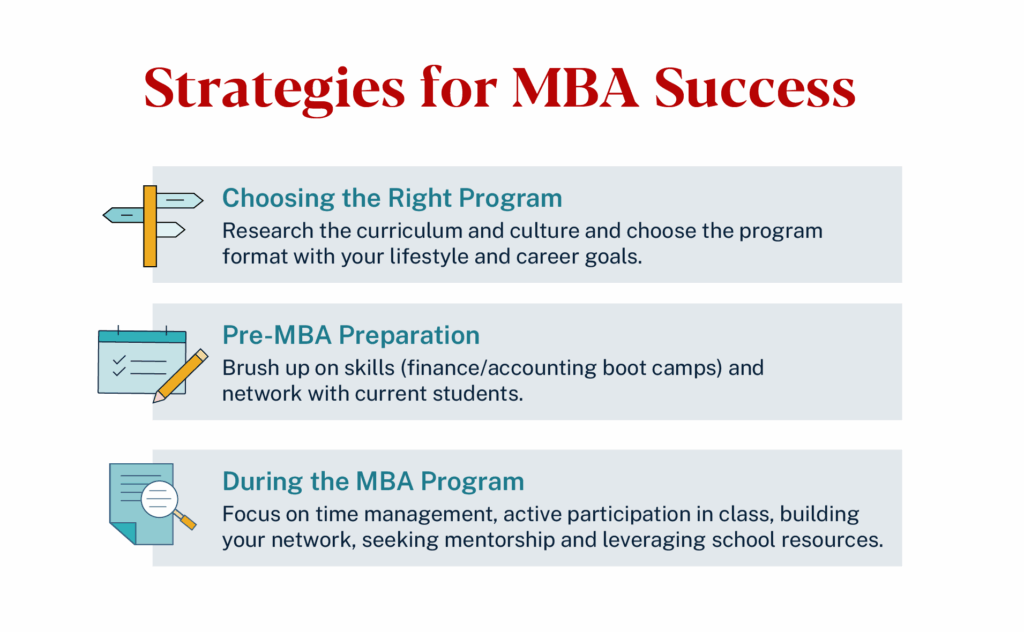
So, you’re thinking about getting your Master in Business Administration (MBA). Great! Now the question lingers, “How hard is an MBA, really?” You’ve probably heard it’s rigorous, time-consuming and maybe even life-consuming. And while there’s truth to that, there’s also a lot more to the story.
The MBA is one of the most versatile and respected graduate degrees out there. It opens doors to leadership roles, new industries and a network of ambitious professionals. However, it also comes with real challenges, which can be academic, emotional, financial and logistical in nature.
This blog will break down what makes an MBA difficult, what factors shape that experience and how to set yourself up for success. Whether you’re debating a full-time MBA vs. part-time or an online MBA program, we’ll help you figure out if this path fits your life, as well as how to make the most of it if it does.
What Makes an MBA Challenging?
The Coursework is No Joke
Let’s start with the obvious: MBA courses are tough. It’s not because they’re impossible, but because they’re packed with high-level content and often delivered at a fast pace. You’ll be diving into subjects like finance, accounting, economics and statistics.
If you’re coming from a non-business background, these quantitative-heavy subjects can feel like learning a new language.
Your Calendar Will Require Attention
Will the MBA require your time? Absolutely. It’s not just about showing up to class or logging on. You’ll be reading several pages each week, working on real-world projects, collaborating with others on group projects and likely still working a full-time job. You’ll probably have other commitments to juggle, like family, friends or hobbies.
Whether you’re in a traditional classroom or studying remotely, expect your time to require some refocusing. When earning an MBA, time management isn’t just helpful. It’s your survival kit.
It’s Mentally and Emotionally Intense
Let’s talk about MBA stress. Between competing deadlines, class presentations and constantly being surrounded by high achievers, it can be easy to feel overwhelmed. Impostor syndrome can be common. And yes, there may be moments when you question your decision entirely. It’s not just the academic load. You might feel the internal pressure to perform at a high level while your personal life takes a back seat.
The Price Tag is Real
Finally, there’s the financial investment. Between tuition, resources and potentially lost income if you’re studying full-time, MBAs aren’t always inexpensive. That said, many students view the opportunity cost as a worthwhile long-term investment. If you’re evaluating value, this MBA value assessment guide is helpful.

What Affects How Hard an MBA Feels?
Not all MBA experiences are created equal. Here are a few things that shape just how difficult the journey will be:
Your Academic Background
If you studied business or economics as an undergrad, the material might feel familiar. If you’re coming from education or engineering, you may need to spend extra time preparing for MBA coursework, particularly when it comes to financial concepts and data analysis.
The Program Format
Different schools structure their MBAs differently, and each type of program has its trade-offs. Here are some formats you might encounter when researching potential programs:
- Full-time MBA: These programs are intense and immersive, ideal if you can take a break from work and commit to being an MBA student first.
- Part-time MBA: These programs are designed for working adults, but juggling work, life and school is no small feat.
- Online MBA: These programs offer flexibility but require serious discipline. Online MBA difficulty often stems from self-management and fewer face-to-face interactions.
The School Itself
Some business schools are known for their competitive, high-pressure environments. Others pride themselves on collaboration and support. School culture and rankings can affect everything from the course load to how stressful your day-to-day feels.
Your Learning Style and Discipline
Are you a self-starter? Do you need an external structure to stay on task? The more independent your program is (especially online), the more you’ll need to be organized and proactive in your MBA studies.
How to Set Yourself Up for MBA Success

Choose the Right Program
- Decide on format. Make sure it fits your lifestyle and goals. It’s a good idea to check each school’s MBA admission requirements, along with program cost and length. (How long does it take to do an MBA? Consult our guide for more details.)
- Research the curriculum. Some programs lean more heavily into finance, others into leadership or entrepreneurship. Some equip you with skills that can be applicable in any industry, and some do that while also allowing you to pursue a specialization. Ensure you pick the program with coursework that’s most applicable to you.
- Check the school’s culture and expectations. What kind of environment are you stepping into? How competitive are student cohorts? How are classes structured, and how available will your instructors be for questions?
Pre-MBA Preparation
- Brush up on the numbers – basic accounting, finance and stats. You don’t need to be an expert, but familiarity helps.
- Take the necessary MBA exams. Many business schools require applicants to take the Graduate Management Admissions Test (GMAT). They use this score to assess an applicant’s readiness for the graduate-level work required. Some schools also accept the Graduate Record Examination (GRE), and some (like American College of Education) don’t require any pre-examinations.
- Connect with current students or alumni. Real talk from those who’ve been there is invaluable. It’ll allow you to get a feel for what the program is really like and how hard it really is beyond what the school says in its marketing materials. They’ll be able to give you accurate information on important things like how many hours a week you’ll need to dedicate to coursework, how responsive instructors are and what student support is offered.
- Set clear goals. Know why you want the MBA and what you want to get from it. Having your goals firmly in mind can help motivate you to keep going when the going gets tough.
During the MBA Program
- Master time management. Your calendar is your best friend. Plan assignments, block out study time and avoid the late-night scramble. This is especially important for part-time and online programs, as you may have a lot of other responsibilities also vying for your time.
- Use every single resource. Study groups, career services, tutoring and mental health support. They exist for a reason. Remember, you’re not doing the MBA on your own, so don’t feel like you need to figure it all out on your own.
- Get involved. Speak up in class, contribute to group work and attend events. Being active helps you learn more and connect with people.
- Build your network. Your classmates could be your future colleagues, investors or business partners. Even if they don’t work in your industry, you never know what you may learn from them. You also never know when you might need their professional expertise in the future.
- Don’t forget yourself. Exercise. Sleep. Eat food that doesn’t come from a vending machine. Self-care helps you perform better.
- Expect setbacks. Not every assignment will be perfect. The key is learning from mistakes, not fearing them. Don’t be afraid to ask for more feedback to help you better understand how you can improve.
- Find a mentor. Whether it’s a favorite instructor or a seasoned student, guidance goes a long way.
Is It Worth It? Measuring the Effort Against the Rewards
At this point, you might be wondering, “Is getting an MBA hard enough to make me regret it?” For most graduates, the answer is no. Despite the stress, effort and cost, the rewards are powerful and long-lasting.
- Career growth: Many MBA graduates move into leadership roles or completely shift industries. Remember, MBA degrees aren’t just for people who work in business. They often equip you with valuable management skills that almost every organization needs.
- Higher earning potential: Over time, an MBA can significantly increase your salary.
- Valuable skills: You’ll sharpen your strategic thinking, leadership, communication and problem-solving abilities.
- Lifelong connections: Your network doesn’t stop growing after graduation. You’ll meet business professionals through classmates and alumni networks.
- Personal transformation: You’ll leave the program more confident, more capable and more prepared for what’s next.
Curious about the full return on investment? See our guide on whether an MBA is worth it, with more details on the benefits and the costs.
Final Thoughts
So, how difficult is an MBA? The honest answer: It’s tough, but it’s not impossible. It’s a test of your time, focus and resilience. But it’s also a chance to level up your skills, expand your network and unlock new career paths. If you’re ready to challenge yourself and committed to growing both professionally and personally, the MBA journey might just be the right one for you.
If you need more information before you submit an MBA application, take a look at our breakdown on whether you should get an MBA or not.
American College of Education’s MBA is not only one of the most affordable online MBA programs – our faculty members and student support teams are dedicated to your success. When things get tough, we’ll be there to help. Explore our online business programs today.

